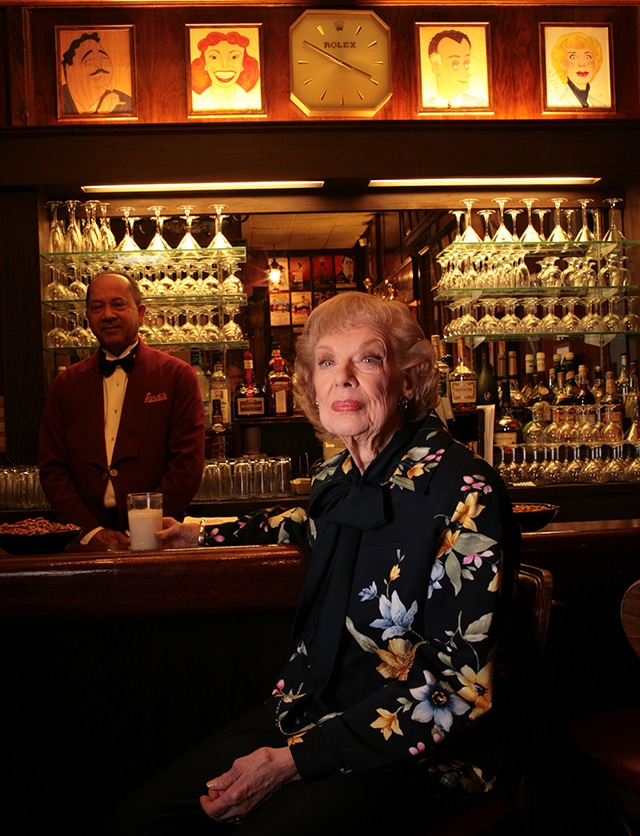Joyce Randolph, who played Trixie Norton, the wife of a guffawing, rubber-limbed sewer worker forever mired in a blowhard neighbor’s get-rich-quick schemes and other hazards of life on the classic 1950s sitcom “The Honeymooners,” died Jan. 13 at her home in the New York City borough of Manhattan. She was 99.
Her son, Randy Charles, confirmed her death.
She was the last survivor of a cast of four that dominated the Saturday-night viewing habits of millions in the golden age of live television, and for decades afterward on rerun broadcasts and home video. Jackie Gleason (Ralph Kramden) died in 1987; Audrey Meadows (Ralph’s wife, Alice) in 1996; and Art Carney (Ed Norton) in 2003.
America’s working-class experience
In an age when status symbols in a gritty Brooklyn tenement were telephones, television sets and refrigerators, the Kramdens had none on a bus driver’s $62 a week. Reflecting America’s working-class experience, they struggled for a better life, shared disappointments and had fun, even if there was no uranium mine in Asbury Park and no market for glow-in-the-dark wallpaper, no-cal pizza or “KramMar’s Delicious Mystery Appetizer,” which turned out to be dog food.
As Trixie, Randolph played the upstairs wife who crossed her arms and commiserated with her best friend, Alice, over addlepated husbands who somehow got drunk on grape juice, found a suitcase of the mob’s counterfeit cash, invented a “handy” kitchen tool that could “core a apple” and, after waiting all year for the convention of their International Order of Friendly Raccoons, took the wrong train.
Although her character was less developed than the others, Randolph was revered by aficionados as the last living link to the inspired lunacy of a show that had a cultlike following, with fan clubs, esoteric trivia contests and memorabilia sales. At a 1984 Long Island meeting of the Royal Association for the Longevity and Preservation of the Honeymooners, or RALPH, one could buy a size-52 bus driver’s uniform or a coveted Trixie apron.
Randolph appeared in the program’s heyday from 1951 to 1957. It was first a skit on “Cavalcade of Stars,” a DuMont network variety show featuring Gleason. From 1952 to 1954, it was a segment on CBS’ “The Jackie Gleason Show.” In 1955-56, it was a self-contained half-hour CBS series, whose 39 episodes were filmed before a live audience of 1,000. Finally in 1957, it reappeared as part of “The Jackie Gleason Show.”
Lowest-paid star
At the peak of the show’s popularity, Randolph was its lowest-salaried star, at $500 a week. Gleason had contracts that paid millions, but he covered all the production costs and took $65,000 to $70,000 an episode. Carney was paid $3,500 and Meadows $2,000 weekly.
The cast had no illusions about making television history, and for Randolph, “The Honeymooners” was hardly even a full-time job. There was only one rehearsal, hours before airtime.
“We never saw Jackie until 11 a.m. on Saturday, the morning of the show,” she recalled in an interview with The New York Times. “At lunchtime there was just one run-through with Jackie. He said that comedy didn’t work if it was overrehearsed.”
A Detroit girl
She was born Joyce Sirola in Detroit on Oct. 21, 1924, one of two children of Carl and Mary Sirola. Her father, a Finnish immigrant, was a butcher.
She graduated from Cooley High School in Detroit and moved to New York in 1943. She began acting at 19, joining a road company production of “Stage Door.”
After touring with “Abie’s Irish Rose” and “Good Night, Ladies,” she made her Broadway debut in 1945 in “A Goose for the Gander,” starring Gloria Swanson. In the late 1940s, she was increasingly on television, seen with Eddie Cantor, Danny Thomas, Fred Allen and the comedy team of Dean Martin and Jerry Lewis.
Gleason spotted her in a 1951 chewing-gum commercial and hired her for a skit on his “Cavalcade of Stars.” She later joined “The Honeymooners,” replacing Elaine Stritch as Trixie after one performance. By then she was known as Joyce Randolph.
‘Honeymooners’ a career high point
“The Honeymooners” was the high point of her career, but it allowed time for many other television roles, mostly as a victim of murder and mayhem. “In the past year,” a 1952 New York Daily News profile said, “TV actress Joyce Randolph has been shot 14 times, strangled four times, stabbed with a penknife three times, tossed out of windows twice, and run down by a speeding limousine once.”
In 1955, Randolph married Richard Charles, a business executive. He died in 1997.
Their son, Randy, is her only survivor.
After leaving “The Honeymooners,” which was revived with various casts in the ’60s and ’70s, she found herself typecast and largely gave up acting, except for occasional television and personal appearances.
Randolph dedicated an 8-foot bronze statue of Gleason at the Port Authority Bus Terminal in 2000. She got a standing ovation at a USO gala in New York in 2006.
“I guess all those young Marines watch television,” she said.
c.2024 The New York Times Company. This article originally appeared in The New York Times.







